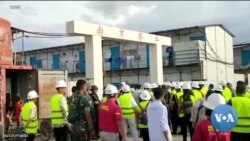ຄວາມເຄັ່ງຕຶງຍັງມີຢູ່ທີ່ໂຮງງານຂຸດແຮ່ທາດນິໂກຂອງຄົນຈີນ ເຊິ່ງຕັ້ງຢູ່ໃນປະເທດອິນໂດເນເຊຍ ລຸນຫຼັງການກໍ່ຈະລາຈົນ ທີ່ຮ້າຍແຮງໄດ້ລະເບີດຂຶ້ນເມື່ອວັນທີ 14 ມັງກອນ. ນັກວິເຄາະກ່າວວ່າ ຄວາມຮຸນແຮງທີ່ເກີດຂຶ້ນນີ້ ໄດ້ ເຜີຍໃຫ້ເຫັນ ເຖິງການດໍາເນີນທຸລະກິດ ຂອງບໍລິສັດຈີນ. ເອລິສຊາເບັດ ລີ (Elizabeth Lee) ມີລາຍງານກ່ຽວກັບເລື້ອງນີ້, ເຊິ່ງ ທິບສຸດາ ຈະນໍາເອົາລາຍລະອຽດມາສະເໜີທ່ານ ໃນອັນດັບຕໍ່ໄປ.
ໃນວັນທີ 14 ມັງກອນ, ມີການປະທະກັນລະຫວ່າງ ປະຊາຊົນຊາວອິນໂດເນເຊຍ ແລະພະນັກງານຊາວຈີນ, ຄວາມຂັດແຍ້ງທີ່ຮຸນແຮງທີ່ບໍ່ພຽງແຕ່ສົ່ງຜົນກະທົບເຮັດໃຫ້ມີຊາວອິນໂດເນເຊຍ ແລະພະນັກງານຊາວຈີນ ເສຍຊີວິດເທົ່ານັ້ນ ແຕ່ມັນຍັງມີຜົນສະທ້ອນ ຕໍ່ຄວມຂັດແຍ້ງທາງດ້ານວັດທະນະທໍາ ແລະການດໍາເນີນທຸລະກິດຕ່າງໆ.
ລີ ຈຽງ (Li Qiang) ຈາກອົງກອນປົກປ້ອງແຮງງານຈີນ ເຊິ່ງໄດ້ປະສານງານກັບແຮງງານຈີນ ຫຼາຍກວ່າ 200 ຄົນ ຢູ່ທີ່ໂຮງງານຂຸດແຮ່ທາດນິກໂກ ໃນປະເທດອິນໂດເນເຊຍ.
ທ່ານລີ ຈຽງ, ຜູ້ບໍລິຫານໃຫຍ່ຂອງອົງການປົກປ້ອງແຮງງານຈີນ ກ່າວເປັນພາສາຈີນກາງວ່າ:
“ບໍລິສັດຂອງຄົນຈີນທີ່ໄປລົງທຶນຢູ່ໃນປະເທດອິນໂດເນເຊຍແມ່ນເພື່ອຫາກຳໄລ. ບໍລິສັດບໍ່ໄດ້ມີສ່ວນຮ່ວມໃນການນໍາເອົາປະໂຫຍດອັນໃດມາໃຫ້ປະເທດອິນໂດເນເຊຍ.”
ໂດຍຜ່ານໂຄງການລິເລີ້ມນຶ່ງແລວທາງນຶ່ງເສັ້ນທາງ, ຈີນ ໄດ້ລົງທຶນໃນດ້ານໂຄງການກໍ່ສ້າງ ແລະໂຮງງານຕ່າງໆຢູ່ທົ່ວໂລກ ລວມມີ ໂຮງງານດັ່ງກ່າວຢູ່ ໃນເມືອງໂມໂຣວາລີ ປະເທດອິນໂດເນເຊຍ. ການຜະລິດໄດ້ເລີ້ມຕົ້ນຂຶ້ນອີກຄັ້ງ ນັບຕັ້ງແຕ່ການກໍ່ຈະລາຈົນທີ່ຮ້າຍແຮງເປັນຕົ້ນມາ, ແຕ່ຄວາມຮຸນແຮງທີ່ເກີດຂຶ້ນດັ່ງກ່າວ ຍັງເປັນສິ່ງເຕືອນໃຈຢູ່.
ກ່ອນການຈະລາຈົນລະເບີດຂຶ້ນ, ບັນດາຄົນງານຊາວອິນໂດເນເຊຍ ໄດ້ພາກັນພົບກັບເຈົ້າໜ້າທີ່ຂອງບໍລິສັດ, ເຊິ່ງພວກເຂົາເຈົ້າຮຽກຮ້ອງໃຫ້ມີການປ່ຽນແປງສະຖານະຂອງການເຮັດວຽກ, ເພີ້ມເງິນເດືອນຂຶ້ນ, ແລະຂໍໃຫ້ຈ້າງງານບັນດາພະນັກງານຂອງສະຫະພັນທີ່ປະທ້ວງຢຸດງານ ໃຫ້ກັບເຂົ້າມາເຮັດວຽກອີກ. ເມື່ອບໍລິສັດ ບໍ່ສາມາດສະໜອງຄວາມຕ້ອງການຂອງສະຫະພັນໄດ້ ບັນດາຄົນງານຊາວອິນໂດເນເຊຍຈຶ່ງໄດ້ພາກັນປະທ້ວງ.
ທ່ານອາຟຣຽນສຢາ ນໍ (Afriansyah Noor), ຜູ້ຊ່ວຍລັດຖະມົນຕີກະຊວງແຮງງານອິນໂດເນເຊຍ ກ່າວເປັນພາສາອິນໂດເນເຊຍວ່າ:
“ພວກເຮົາມອງເຫັນບັນຫາຕ່າງໆເຫຼົ່ານີ້ຮວບຮວມກັນເຂົ້າ ປະສົມກັບການຂາດການສື່ສານລະຫວ່າງກັນ ຈຶ່ງກາຍມາເປັນການລະເບີດອອກມາ.”
ທ່ານລີ ຈຽງ, ຜູ້ບໍລິຫານໃຫຍ່ຂອງອົງການປົກປ້ອງສິດທິຂອງແຮງງານຈີນ ກ່າວເປັນພາສາຈີນກາງວ່າ:
“ບໍລິສັດຂອງຊາວຈີນ ບໍ່ເຄີຍມີແບບແຜນໃນການເຈລະຈາກັບສະຫະພັນແຮງງານ. ບໍລິສັດຂອງຊາວຈີນ ຈະບໍ່ດໍາເນີນການໃດໆແບບນັ້ນ. ຈີນ ເພິ່ງພາອາ ໄສຜະລິດຕະພັນຈາກໂຮງງານທີ່ບໍ່ໄດ້ມາດຕະຖານ ເພື່ອສ້າງສາລະບົບເສດຖະ ກິດທີ່ມີຄວາມມະຫັດສະຈັນຂອງຕົນ.”
ນັກຊ່ຽວຊານຊາວຈີນ ທ່ານຫົງຢີ ຫຼາຍ (Hongyi Lai) ກ່າວວ່າ ແບບຢ່າງການດໍາເນີນທຸລະກິດຂອງຊາວຈີນຢູ່ໃນຕ່າງປະເທດແມ່ນໄດ້ມີການນຳໃຊ້ໄກ ໄປກວ່າປະເທດອິນໂດເນເຊຍ.
ທ່ານຫົງຢີ ຫຼາຍ, ນັກຊ່ຽວຊານຊາວຈີນ ຈາກມະຫາວິທະຍາໄລ ນັອດຕິງແຮມ ກ່າວຜ່ານຊູມວ່າ:
“ສໍາລັບໂຮງງານບາງໂຮງງານຂອງຊາວຈີນເຫຼົ່ານີ້, ພວກເຂົາມີຄວາມຮູ້ສຶກວ່າ ພວກເຂົາຕ້ອງການໃຊ້ແຮງງານຢູ່ໃນທ້ອງຖິ່ນ. ບໍ່ພຽງແຕ່ຢູ່ໃນເອເຊຍຕາເວັນອອກສຽງໃຕ້ເທົ່ານັ້ນ, ແຕ່ຢູ່ທະວີບອາຟຣິກາເຊັ່ນດຽວກັນ, ບໍ່ມີໃຜຕ້ອງການທີ່ຈະເຮັດວຽກເປັນເວລາດົນນານ ໃນຈໍານວນຄ່າຈ້າງເທົ່າທີ່ພວກເຂົາເຈົ້າໄດ້ຮັບ.”
ທ່ານ ລີ ກ່າວວ່າ ຄົນງານຈີນ ກໍໄດ້ຖືກນຳເອົາເຂົ້າໄປເຮັດວຽກຢູ່ທີ່ນັ້ນ ໂດຍມີລັກສະນະຂູດຮີດຄົນງານຈີນເຊັ່ນດຽວກັນ, ເຊິ່ງທ່ານໄດ້ກ່າວວ່າ:
“ການປະຕິບັດກັບຄົນງານຊາວຈີນ ແມ່ນຮຸນແຮງກວ່າ ຄົນງານອິນໂດເນເຊຍ, ເນື່ອງຈາກວ່າ ຖ້າຄົນງານຈີນຫາກບໍ່ປະຕິບັດຕາມຄໍາສັ່ງ ບໍລິສັດກໍມີສະຖານທີ່ສໍາລັບກັກຂັງຄົນງານຕ່າງໆເຫຼົ່ານັ້ນ, ເຊິ່ງບໍລິສັດສາມາດຂັງພວກເຂົາໄວ້ໂດຍບໍ່ມີໂອກາດໄດ້ໄປຫາຕໍາຫຼວດ.”
ໂຮງງານຂຸດແຮ່ທາດນິກໂກ ບໍ່ຕອບອີເມລຂອງ VOA ທີ່ສອບຖາມກ່ຽວກັບຂໍ້ກ່າວຫາດັ່ງກ່າວ. ພວກເຂົາບອກ VOA ພາກພາສາອິນໂດເນເຊຍ ໂດຍຜ່ານທາງຂໍ້ຄວາມໂທລະສັບວ່າ ກອງທັບອິນໂດເນເຊຍ ແລະຕໍາຫຼວດກໍາລັງດໍາເນີນການກວດສອບກ່ຽວກັບເຫດການດັ່ງກ່າວນີ້ຢູ່.
ກະຊວງການຕ່າງປະເທດຂອງຈີນ ກໍກ່າວກ່ຽວກັບເຫດການການກໍ່ຈະລາຈົນດັ່ງກ່າວນີ້ເຊັ່ນກັນ.
ທ່ານຫວັງ ເວິນບິນ (Wang Wenbin), ໂຄສົກກະຊວງການຕ່າງປະເທດຂອງຈີນ ກ່າວເປັນພາສາຈີນກາງວ່າ:
“ຝ່າຍຈີນ ຈະຕິດຕໍ່ສື່ສານໃຫ້ໃກ້ຊິດກັບຝ່າຍຂອງອິນໂດເນເຊຍ ເພື່ອໃຫ້ໝັ້ນໃຈວ່າ ຈະສາມາດຈັດການກັບເຫດການດັ່ງກ່າວ ໃຫ້ຖືກຕ້ອງເໝາະສົມຕາມກົດໝາຍ.”
ທ່ານ ຫຼາຍ ກ່າວວ່າ ການຈະລາຈົນໃນປະເທດອິນໂດເນເຊຍ ມີຂຶ້ນພາຍໃຕ້ຂໍ້ຄວາມປະຫວັດສາດ ຂອງຄວາມບໍ່ໄວ້ວາງໃຈ ທີ່ມີຕໍ່ຊາວຈີນ, ເຊິ່ງທ່ານໄດ້ກ່າວວ່າ:
“ໃນຈໍານວນປະຊາກອນອິນໂດເນເຊຍ ທີ່ມີເປັນຈໍານວນຫຼວງຫຼາຍ, ພວກເຂົາ ເຈົ້າຍັງມີຄວາມກັງວົນຢູ່ ໃນສ່ວນເລິກກ່ຽວກັບສິ່ງທີ່ຈີນເປັນ ໂດຍສະເພາະແມ່ນຄວາມສົງໄສ, ແລະຄວາມສົງໄສກ່ຽວກັບອິດທິພົນທີ່ເປັນໄປໄດ້ຂອງຈີນ ຫຼືການ ບຸກລຸກເຂົ້າໄປທາງດ້ານພື້ນຖານທາງການເມືອງ ແລະເສດຖະກິດຂອງປະເທດ.”
ບັນດາຄົນງານຊາວອິນໂດເນເຊຍ ແລະບໍລິສັດດັ່ງກ່າວ ກໍາລັງດໍາເນີນການໄກ່ເກ່ຍ ເພື່ອແກ້ໄຂຄວາມຂັດແຍ້ງ ໃນຂະນະທີ່ຄວາມເຄັ່ງຕືງຍັງຄົງດໍາເນີນຢູ່ຕໍ່ໄປ.
Tensions continue to simmer at a Chinese-owned nickel smelting facility in Indonesia after a deadly riot erupted on January 14. Analysts say the violence sheds light on the business practices of a Chinese company. VOA’s Elizabeth Lee has the details.]]
On January 14, a clash between Indonesian and Chinese workers — a violent conflict that not only resulted in the deaths of an Indonesian and a Chinese worker but also reflected the conflict between cultures and business practices.
Li Qiang with China Labor Watch organization has been corresponding with more than
200 workers at this Chinese-owned nickel smelting facility in Indonesia.
Li Qiang, China Labor Watch Executive Director, Male, In Mandarin
“The Chinese company that’s investing in Indonesia is there to make money. The company did not bring good corporate practices to Indonesia.”
Through its Belt and Road Initiative, China has been investing in construction projects and factories around the world, including this facility in Morowali, Indonesia. Production has started up again since the deadly riot, but reminders of the violence remain.
Before the riot broke out, Indonesian workers had met with company officials, demanding that working conditions change, wages increase and union workers who had gone on strike be rehired. When the company failed to meet all the union’s demands, Indonesian workers staged a protest.
Afriansyah Noor, Indonesian Deputy Minister of Manpower, Male, In Indonesian
“We saw these issues accumulate, combined with lack of communication, [and it] finally blew up.”
Li Qiang, China Labor Watch Executive Director, Male, In Mandarin
“The Chinese company has never had the tradition of negotiating with labor unions. Chinese companies will never do something like that. China relies on sweatshops to produce its economic miracle. The model is copied in Indonesia.”
The Chinese model of running a business in a foreign country is also replicated beyond Indonesia, says China expert Hongyi Lai.
Hongyi Lai, University of Nottingham China Expert, English, Zoom
“For some of these Chinese plants, they feel that when they use the local workers — they have not just probably in Southeast Asia but also Africa as well, — as the local workers, may not want to work such a long time for the pay they’re given.”
Chinese workers are also brought in to work. It’s a model that also exploits Chinese workers, says Li.
Li Qiang, China Labor Watch Executive Director, Male, In Mandarin
“The treatment of the Chinese workers is harsher than that of the Indonesians because if the Chinese workers don’t follow orders, the company has places to detain the workers. The company can lock them up without going through the police.”
The Chinese-owned nickel smelting facility has not responded to VOA’s email asking about these allegations. It told VOA Indonesia in a text message that Indonesian military and police were still investigating the incident.
The Chinese Foreign Ministry had this to say about the riot:
Wang Wenbin, Chinese Foreign Ministry Spokesperson, Male, In Mandarin
“The Chinese side will stay in close communication with the Indonesian side to ensure that the incident is properly handled in accordance with the law.”
The riot in Indonesia comes within the context of a history of distrust toward the Chinese says Lai.
Hongyi Lai, University of Nottingham China Expert, Zoom
“Within the big Indonesia population, they still have some deep-seated uneasiness, uneased to what China, especially politically suspicious, and suspicions about China's possible influence, or intrusion into the country's political and economic base.”
The Indonesian workers and the company are going through mediation to resolve the conflict as tensions continue.





